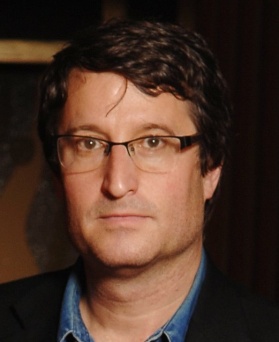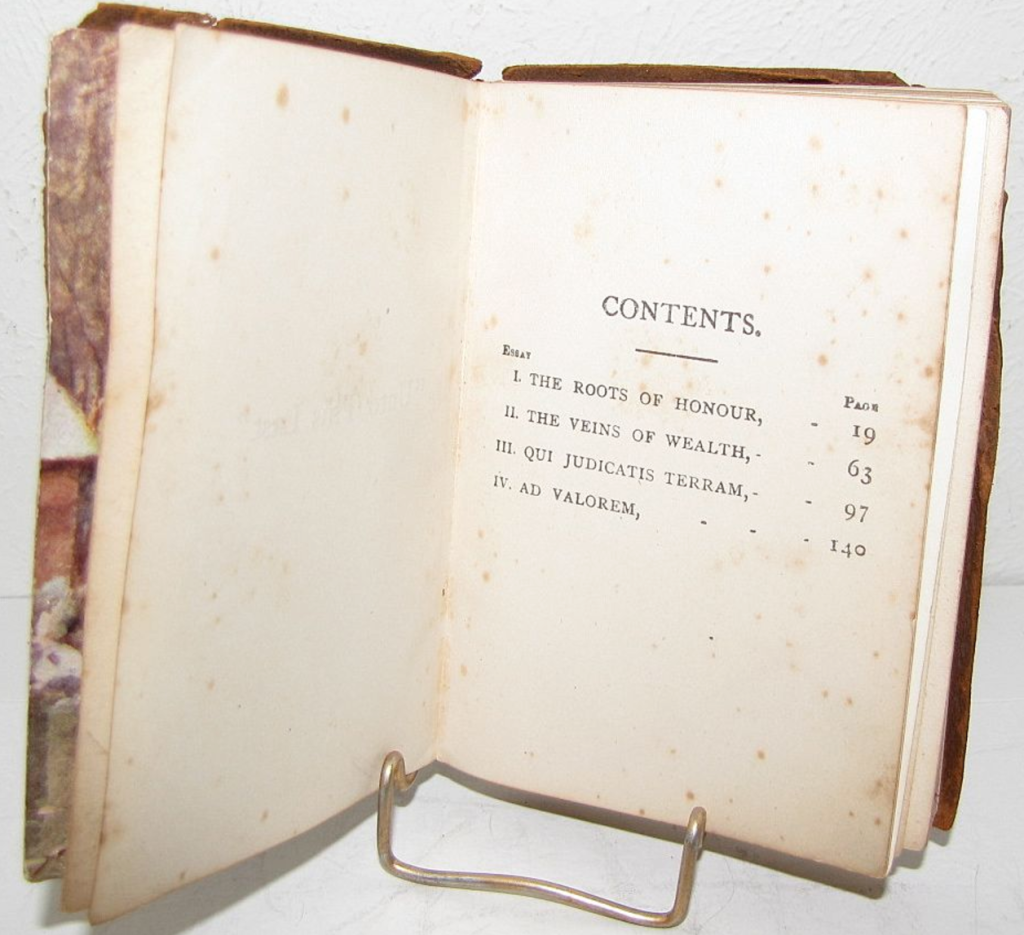Tom Block, an artist and author of five published books, believes art is a vehicle for human rights activism; he connects 13th-century ideals of “legislative prophecy” with the present, looking for a moral center in politics, the economy, and social interactions. In this post, Block (who you can follow on Twitter at @tomblock06 and learn more about at http://www.tomblock.com/) draws lessons from a 150-year-old book about the problems with and how to improve America’s economic system.

Let’s forget about Trump for a moment.
After all, as fun and exciting and different as his presidency is proving to be, he will not – in the end – change the course of human events. Even less so, of the economic pressures that aggrieve and threaten to crush us. Where Trump is a pimple on the butt of American history, our ongoing economic anarchy is a blistering, cancerous abscess affecting the fate of all of people.
I picked up a book the other day which threw the greed, inequality, lawlessness, and inhumanity of our Western capitalist system into stark relief. And given that this series of essays was written more than 150 years ago, at the infancy of the Industrial Revolution, I found it both prescient and deeply disturbing.
It diagnosed the creeping illness of the economic system of mid-19th century England, which so closely parallels our own, in 21st-century America. The only difference being that the ability for “economical science” (as the author called it) to wreak havoc on society and individuals has grown exponentially, keeping time with our frantic technological progress.
More than that, however, the slim pamphlet provides a potential palliative for this social illness.
I’m talking about an 1860 series of four essays, “Unto this Last,” by writer and philosopher John Ruskin. Ruskin set out to show how economic health concerns far more than the acquisition of “all useful and agreeable objects which possess exchangeable value” (Ruskin quoting John Stuart Mill). He laid out quite clearly that true economical well-being involves evaluating the totality of society, not just the amount of gold distributed among the fewest number of people (as seemed to define – and continues to delineate – the true state of “wealthy” nations). In his view, “just or economical exchange…is simply [that wherein there is] advantage on both sides [and] whatever advantage there is on either side…should be thoroughly known to all concerned. All attempt at concealment implies some practice of the opposite.” He also chafed at the idea that people with different interests (for instance, labor versus capital, or client versus producer, etc.) must “necessarily regard each other with hostility, and use violence or cunning to obtain the advantage.”
Obviously, this kind of transparency and fairness runs directly contrary to what is considered “sound” business practice. As many current chairmen of publicly held corporations would surely note, their obligation is to their shareholders, not to consumers, to the health of the environment or nation, or even their own workers. Isn’t the idea of having an economic exchange which is of “advantage on both sides” not only absurd, but antithetical to good business practice?
It’s a zero sum game, man! There are winners and losers in life – and we want to be on the side of the winners!
This dynamic of greed and self-justification stretches back to the beginnings of capitalism, often dated by historians to fourteenth-century England. As Ruskin argued, those in power “never professed, nor profess, to take advantages of a general nature into consideration.” Instead, they believe they are simply experts at “the science of getting rich…Every man of business knows by experience how money is made, and how it is lost,” they’d argue.
Ruskin has an easy reply to this line of reasoning – one that all progressives should keep handy when arguing economic theory with the smarmy and self-certain advocates of economic anarchy (“deregulate the banks!” “deregulate the corporations!” “eviscerate environmental protections!” “never, ever raise the minimum wage!,” etc.):
The circulation of wealth in a nation resembles that of the blood in the natural body. There is one quickness of the current which comes of cheerful emotion or wholesome exercise; and another which comes of shame or of fever. There is a flush of the body which is full of warmth and life; and another which will pass into putrefaction.
As diseased local determination of the blood involves depression of the general health of the system, all morbid local action of riches will be found ultimately to involve a weakening of the resources of the body politic.
And so it is: as the inequality of wealth accretes (as it certainly has since the presidency of Ronald Reagan, he whose name graces an airport, a federal building and perhaps, some day, the dime), the health of the nation, as well as the environment upon which the nation sits and depends, weakens. And so too, if we can judge by the growing anti-science, anti-truth legions collecting in our public square, does the mental acumen of the polis.
So what is one to do?
One of the hallmarks of my belief in activist social theories is that they be applicable, and lead to quantifiable, positive social change. We must move beyond simply expressing opposition to current political and social energies, to devising specific manners of combatting them. We must develop, as Hannah Arendt called them, “clumsy theories” – theories which can actually be implemented.
Ruskin’s ideas show a way forward in the realm of the 21st-century global economy. And although I believe he would support a universal basic income, universal health care and access to housing for all, he states no such thing, and certainly is no proponent of communism or socialism.
I feel it is his acceptance of capitalism as the economic structure which makes his ideas more powerful. He is not going against what most people in our society (and certainly the older monied class, though not always today’s youth) accept as the “best” way for the economy to work. Rather, he is tweaking, infiltrating and massaging it to make it work for a far greater portion of the population. And in the best of cases, for the entire society.
Ruskin reconsidered the manner in which we think about the most basic aspects of a healthy society. For instance, he noted: “The vital question, for individual and for nation, is, never ‘how much do they make?’ but ‘to what purpose do they spend?’” Today, 21st-century “educated consumers” – all of those purchasing organic and fair-trade goods, buying local and at farmer’s markets, examining labels to make certain they weren’t made in far-away sweatshops, staying away from Walmart, Target and other multi-national corporations while paying a little bit extra to support the locally owned store or individual market – are living by Ruskin’s code.
Doing so does cost a little bit more, and given that reality and many workers’ low pay, we also need to think in terms of another movement gathering steam, one that Ruskin would heartily endorse: the Fight for $15. For Ruskin made it very clear that the price of labor should not be set by the anarchy of the marketplace and desperation of the worker. A fair and living wage should be paid to all, he argued:
The abstract idea, then, of just or due wages, as respects the laborer, is that they will consist in a sum of money which will at any time procure for him at least as much labor as he has given, rather more than less. And this equity or justice of payment is, observe, wholly independent of any reference to the number of men who are willing to do the work.
This idea of “procuring at least as much labor as he has given” translates into an equitable exchange in which workers are paid what they’re truly worth, not what business owners say they are. We definitely see this idea in force now, as over the past couple of years, the ideal of a $15/hour minimum wage has been gathering steam. Low-wage earners in many cities and states can now take home pay more in line with their time expenditure, and thus have greater purchasing power.
Finally, we need to follow Ruskin’s lead and center honesty in our economic thinking. Currently, the idea of “honesty” in commerce runs contrary to our economic model. Our economy is built on lying to consumers, usually obliquely through advertising messaging, but sometimes through overbilling, frank misstating of a product’s benefits, and outright fraud, such as Wells Fargo Bank’s practice of opening expensive bank accounts without informing people of their fees. But it doesn’t have to be that way; as Ruskin said:
The acquisition of [true] wealth is finally possible only under certain moral conditions of society, of which quite the first was a belief in the existence and even, for practical purposes, in the attainability of honesty…There is no Wealth but Life. Life, including all its powers of love, of joy, and of admiration. That country is the richest which nourishes the greatest number of noble and happy human beings; that man is richest who, having perfected the functions of his own life to the utmost, has also the widest helpful influence, both personal, and by means of his possessions, over the lives of others.
Ruskin’s ideas are hardly revolutionary. He does not advocate for the cessation of wealth accrual, or the destruction of the capitalist system. He only advocates for ramming a moral lodestar into the center of the system. There would still be labor and capital – but capital would treat labor with humanity, kindness, fairness and honesty. Money could still be won, but it would no longer be the “god” it has risen to in our pagan economic system; it would be simply a byproduct of hard work and good ideas, not malfeasance, cleverness and trickery. And when gobs of money were won, the “winner” would treat all the laborers in their orbit with fairness and honesty, as well as do their best to protect the values of respect, health and morality.
Unto this Last thus holds much wisdom for today’s progressive economic and social thinker. The kind of tweaks, infiltrations, and moral compass Ruskin proposes – if advocated by enough people through specific legislative, legal and economic proposals – might actually begin to create the kind of practical utopia he envisioned. Many such ideas – a universal basic income, access to higher education for all, health care as a human right, etc. – are already percolating in our society. In some cases, like a living wage, social pressure has driven legislative action and these ideas are actually beginning to be implemented through legislation.
Now we just need more of that!

Leave a comment